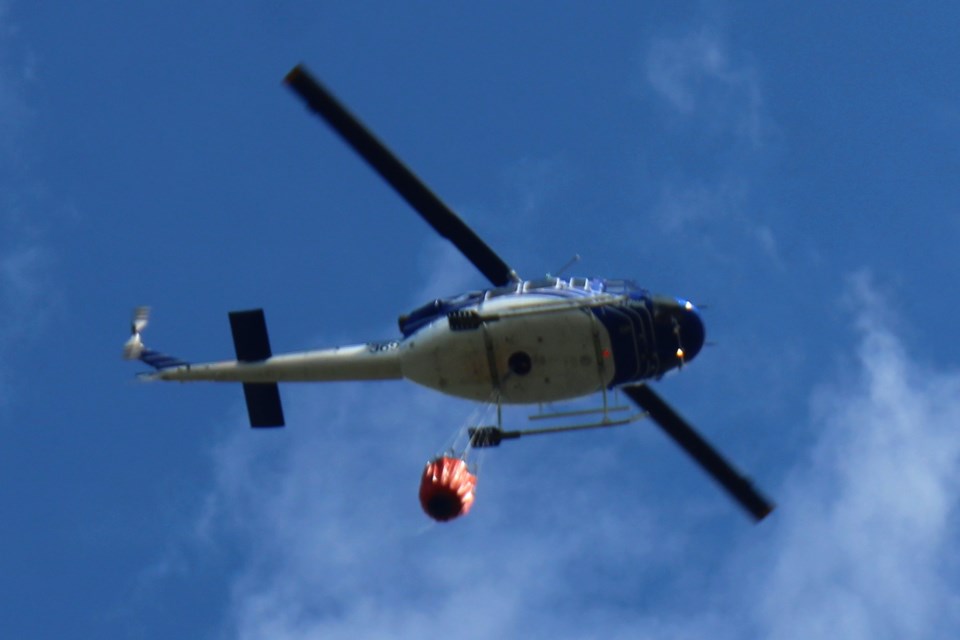Several northern forest fires continue to burn, but cooler weather, rain and favourable winds are keeping them from growing in size.
Few new hotspots have been reported in the past week with the blaze near Pukatawagan/Mathias Colomb Cree Nation (MCCN). That fire is the largest fire and closest to an established community in either northern Manitoba or Saskatchewan, called the WE026 fire by Manitoba Wildfire Services (MWS). The last reported cluster of hotspots was reported about 12 kilometres northwest of Pukatawagan north of the Churchill River.
Favourable wind and weather have helped knock down the fire, keeping it away from Pukatawagan and assisting firefighters, but the fire is still considered to be "out of control" according to MWS.
"Less than one kilometre east of Mathias Colomb Cree Nation (MCCN), the WE026 fire is estimated to be 52,760 hectares. Due to the vicinity of the wildfire, the community has been evacuated," reads the July 29 fire update.
"Favourable weather conditions and progress on firefighting efforts have decreased the risk to the community and critical infrastructure."
The evacuation order for Pukatawagan is still in place, due in part to the fire burning infrastructure around the community, including powerlines. Pukatawagan residents, who have been evacuated to areas like Thompson, The Pas, Brandon and Winnipeg, still may not be able to return home for several days. Media reports from Winnipeg-based news agencies have included reports from some evacuees of being kept in hotel rooms in the provincial capital with mould and cockroaches. An emergency shelter has been opened at the University of Winnipeg.
Good news is starting to come in regarding the fire, however. Manitoba Hydro announced July 28 that it would be transporting two large diesel generators to Pukatawagan in the coming days to power the community, which has been partially cut off from power due to power poles catching fire - about 80 of them in total.
"Two 1,500 kilovolt generators are currently en route from Alberta. Fuel for the generators, plus replacement poles and other materials needed to rebuild the line, are also being shipped by rail. Under current plans, the earliest residents may begin returning home is the second week of August," reads the announcement from Manitoba Hydro.
"Manitoba Hydro is providing regular updates to the leadership of MCCN and other agencies such as Indigenous Services Canada, MWS and the Canadian Red Cross. Generators will be in place until full repairs are completed."
The generators are too heavy to be brought in through the air and cannot be driven to Pukatawagan - the community does not have a road leading to it.
“We’re really lucky the fire didn’t damage the rail line,” said Manitoba Hydro director of rural operations Cyril Patterson.
“The size and weight of the generators we need to bring into the community mean rail is the only way to get them there — no aircraft could manage that kind of load. Our goal is to get the community powered up so residents can return home as we rebuild the line. The damaged poles are in a remote area with no road access, so we’ll rely on helicopters to bring in crews and equipment to do a lot of the work."
Members of the Manitoba Animal Alliance (MAA) also headed to Pukatawagan to rescue pets left behind during the evacuation effort, which often cannot be brought out of town in evacuatory transport or kept in emergency shelters. The MAA brought dog and pet food to the community for dogs left behind to eat and has brought a small number of dogs out of the community.
WE050/Richard
North of Flin Flon, a pair of fires are still burning about 35 to 40 kilometres away from town and may have combined into one big blaze, but neither are close enough to be considered threatening.
The WE050 fire, located on the Manitoba side, and the Richard fire, located in Saskatchewan, are believed to have connected near Mari Lake. The two fires combined, according to the Natural Resources Canada (NRC) Canadian Wildland Fire Information System, have a total size of about 9,140 hectares and are still considered to be "out of control" by the NRC.
"Estimated at 2,300 hectares in size, MWS is working with Saskatchewan to action the WE050 fire. There is no immediate threat to any community or properties," reads a Manitoba provincial update mentioning the Manitoba portion of the fire.
A smaller fire located on Missi Island in Amisk Lake, located not far from Denare Beach, has been moved to being "contained" according to the Saskatchewan Public Safety Agency as of July 29. The fire, which was started by lightning July 28, was quickly put out and only reached a size of about .1 hectares.
Fire danger over the weekend is expected to hang around a "low" level, as rain and cooler temperatures are expected throughout the weekend and into early next week.




